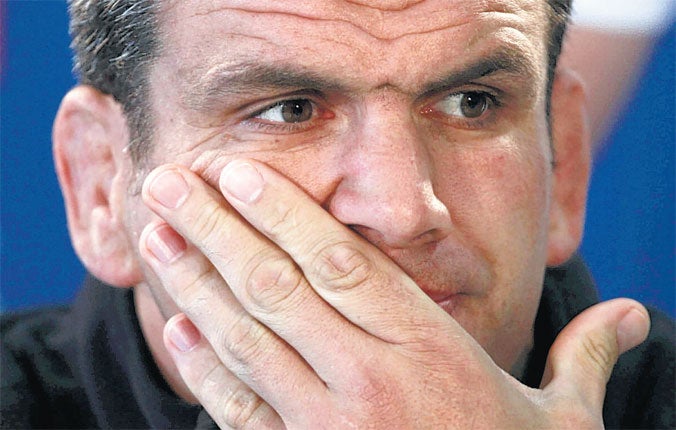James Lawton: If Tindall and Co are such great pros, why cavort like amateurs?
Imagine the national outrage which might have ensued if Wayne Rooney had been similarly compromised

Forget for a moment Mike Tindall is wedded to the Royal family, which was obviously too much to ask of any red-blooded tabloid editor acquainted with the fact that he had been seen in a clinch with a large-bosomed denizen of a late-night New Zealand bar which specialises in dwarf-throwing contests.
Put aside also that he is captain of the England World Cup rugby team which a couple of weeks ago was pronounced sufficiently adult by their manager Martin Johnson to be absolved of any need to follow curfews, drinking bans and any of the other strictures that normally apply to fully fledged professional sports squads.
Imagine, instead, the concentrated national outrage which might have ensued if Wayne Rooney or John Terry or Rio Ferdinand had been similarly compromised after a performance generally agreed to be one of the most underwhelming in the infant tournament which every four years seeks to identify the best team in the world.
There would probably have been questions in the House – all based on the belief that superstar football players are over-paid, under-dedicated and, well, a disgrace to the nation.
This conclusion has been set on default mode for several decades now, reaching one early high point of disdain in 1996 when the likes of Paul Ince, Alan Shearer and Paul Gascoigne released some steam at the end of a tour of the Far East.
The boys became somewhat tired and emotional after stints in the "dentist's chair" of a Hong Kong bar. There was no throwing of dwarves, just a few minutes in the chair with their mouths wide open while someone poured in generous quantities of hard liquor.
One charge rarely levelled against rugby players, perhaps because quite a number of them enjoyed the benefits of private education, is that some of them appear to be spectacularly thick. No, when they throw dwarves, wrestle with bar girls, make bungee jumps and wild water raft descents on the eve of the most serious competition they are ever likely to face, it is generally considered not so much desperate irresponsibility, a failure to separate serious business from lad-like jaunting, but sheer high spirits, a macho lust for life. This also often includes, lest we forget, the kind of violence which if committed on the street would not elicit invitations to a royal wedding but another kind of visit to one of Her Majesty's establishments.
What we have in this latest episode, it is difficult not to believe, is more evidence that despite much heralding of the age of professional rugby union, the game is frequently rooted in some deeply amateurish behaviour. Johnson suggested that his game had moved beyond the need for petty restraints. In a professional age, international rugby players were entitled to be treated like genuinely, grown-up blokes. It's a reassuring image, the big hitters and the nippy threequarters, bonding like troops stepping down from the front line for a few hours.
The opening victory over Argentina was a vital first step but much of the execution was dismayingly poor, and, so why not a few reflections over a couple of beers, a relaxation of the tension which at one point had threatened to be fatal?
Unfortunately it is an image hardly supported by the tabloid pictures of the dishevelled Tindall, Chris Ashton and Dylan Hartley sprawling in the bar. These doubts were, naturally, dismissed in a statement from the Rugby Football Union which spoke of the players' enjoyment of a few hours off after a "hard-earned" and "passionate" victory.
Some devotees of the oval ball will no doubt be quick to point out that the England rugby team, unlike their football cousins, have behind them an impressive degree of achievement for which we don't, as in football, have to reach back 45 years.
England won the World Cup of rugby in Australia just eight years ago, then in 2007 reached another final in Paris. But then all the more reason, some might say, for an effort in New Zealand which speaks of more serious intent than some minor boyish rampage with the Extra B XV.
Three years ago an England party was seriously compromised in New Zealand by late-night drinking and charges of sexual misbehaviour with a local teenager. Judge Jeff Blackett, the union's legal adviser, produced a raft of recommendations, concluding with a roundhouse swipe at late drinking and poor discipline.
"Such activities," he declared, "are now inconsistent with the life of an elite professional rugby player in the modern era and membership of a team seeking to be the best in the world."
At that time, and perhaps understandably, he had no comment to make on the deleterious impact of late-night dwarf-throwing. Presumably, he would not have approved.
Subscribe to Independent Premium to bookmark this article
Want to bookmark your favourite articles and stories to read or reference later? Start your Independent Premium subscription today.

Join our commenting forum
Join thought-provoking conversations, follow other Independent readers and see their replies